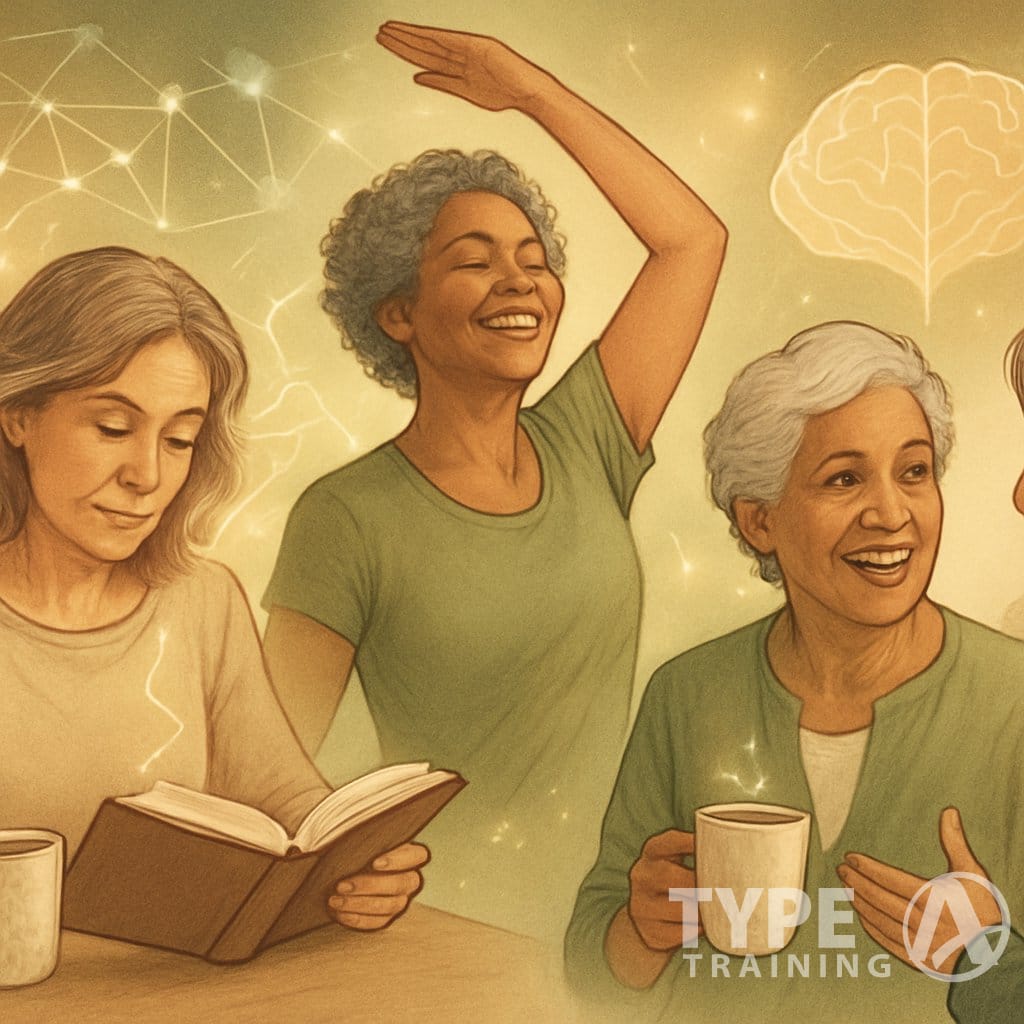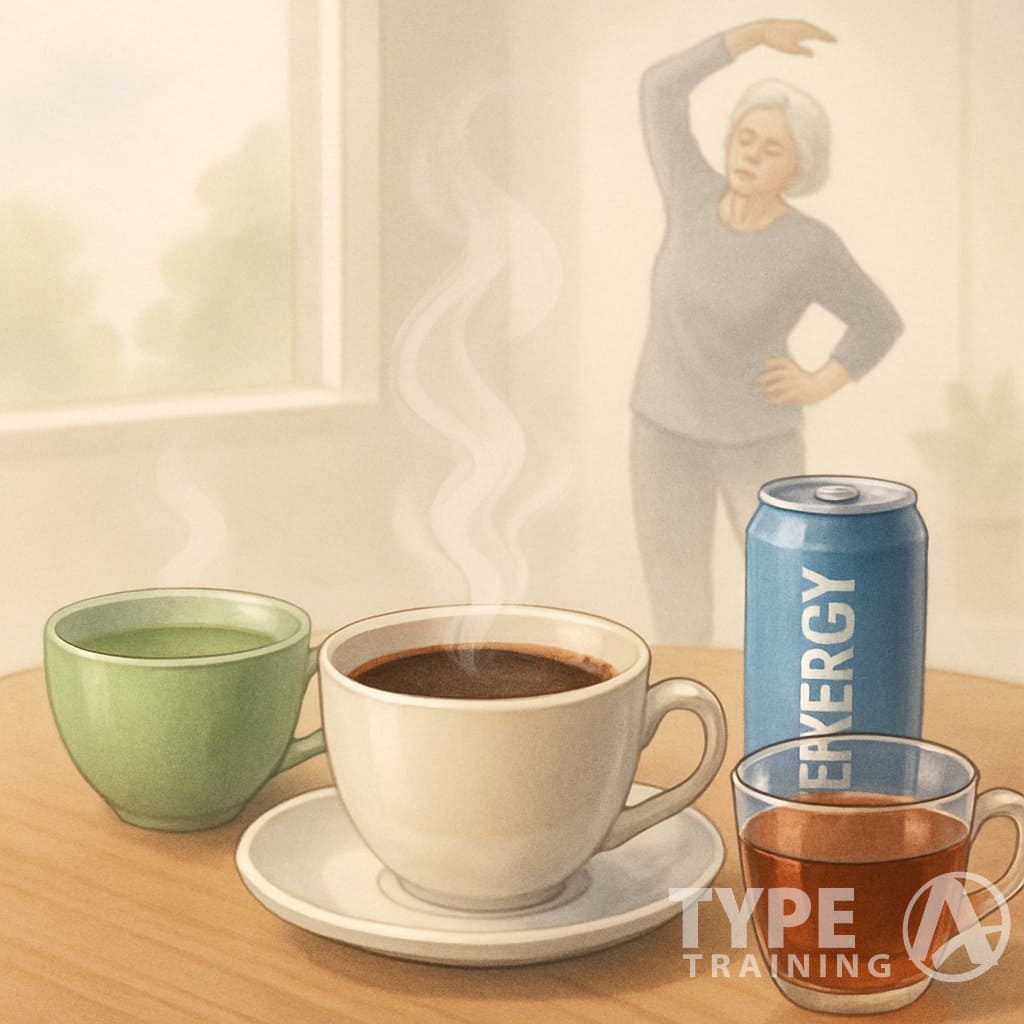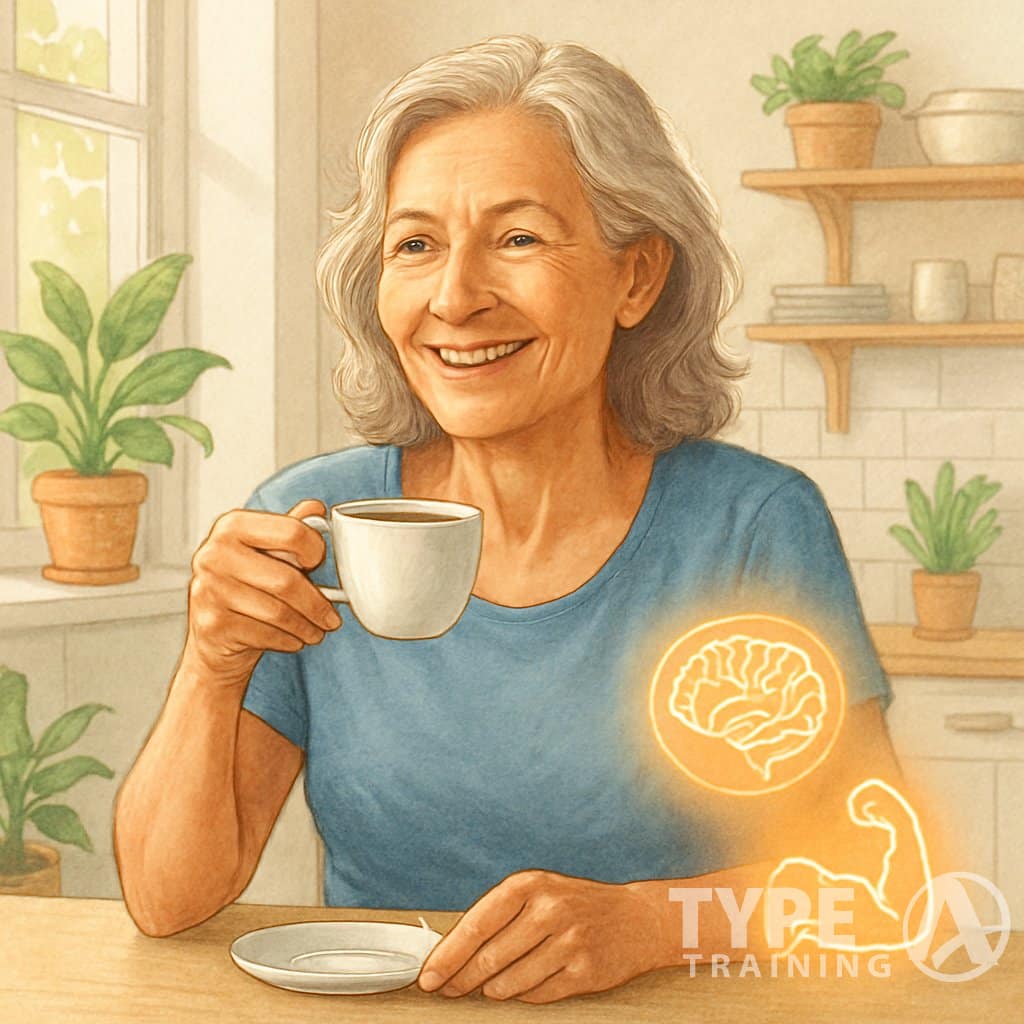Ladies, your morning cup of joe might be doing more than just waking you up. Recent research suggests that women who drink coffee regularly may enjoy better health as they age, particularly regarding the coffee benefits for aging women.
A study following over 47,000 women found that those who consumed one to three cups of caffeinated coffee daily in their 50s were more likely to reach older age with good cognitive function, physical health, and freedom from major chronic diseases.

The benefits seem especially strong for women’s brains and physical function, emphasizing the coffee benefits for aging women. Scientists tracked participants for decades and noticed that coffee drinkers maintained better memory, thinking skills, and mobility compared to those who skipped the brew.
Popular posts:
This isn’t just about living longer—it’s about living better into your 70s and beyond.
What really stands out is how coffee might support healthy aging on several fronts, highlighting the coffee benefits for aging women. Your daily coffee habit could be quietly helping you stay independent and enjoy a higher quality of life as the years go by.
Key Takeaways
- Women who drink 1-3 cups of coffee daily show better cognitive function and physical health as they age.
- Regular coffee consumption is linked to lower rates of chronic diseases and improved mental wellbeing in women over 70.
- The benefits of coffee appear most significant when consumption begins in middle age and continues as part of a healthy lifestyle.
The Science Behind Coffee Consumption and Aging in Women

Recent research uncovers some fascinating links between coffee and healthy aging in women, reinforcing the coffee benefits for aging women. Scientists have zeroed in on certain compounds in coffee that may boost cognitive and physical health as women get older.
Key Components of Coffee and Their Biological Effects
Coffee isn’t just about caffeine—it’s packed with over a thousand bioactive compounds. You’ll find polyphenols, melanoidins, and a variety of antioxidants in every cup, all working to fight oxidative stress.
Chlorogenic acids, which show up in generous amounts, help regulate glucose metabolism and tamp down inflammation. This anti-inflammatory effect might be one reason why habitual coffee intake reduces all-cause mortality in long-term studies.
Coffee’s bioactive compounds actually support cellular health by kicking off autophagy—your body’s natural “cleaning” system that sweeps out damaged cells. That process gets more important as you get older.
There’s more: these compounds also support mitochondrial function, giving your cells more energy and maybe slowing down some of the physical decline that comes with age.
Role of Caffeine and Bioactive Compounds
Caffeine, the main psychoactive ingredient in coffee, blocks adenosine receptors in your brain. That makes you feel more alert and may even help protect against cognitive decline as you age.
Studies suggest that moderate coffee consumption (usually 1-5 cups a day) is linked to better cardiovascular outcomes. And let’s be honest—your heart health matters a lot for how your brain ages.
Coffee’s phenolic compounds act as antioxidants, neutralizing free radicals that can damage cells. This could be especially helpful for women dealing with hormonal changes later in life.
Trigonelline, a bitter alkaloid in coffee, seems to help with insulin sensitivity. Better glucose regulation supports both your brain and your body as the years tick by.
Genetic Variation and Individual Differences
Your CYP1A2 gene controls how fast you metabolize caffeine. If you’re a “fast metabolizer,” you might get more benefits and fewer jitters than someone who processes caffeine slowly.
Women generally metabolize caffeine more slowly than men, which probably explains why ideal coffee intake levels aren’t the same for everyone. Listen to your body—it’ll tell you what works.
Genetics also shape how you respond to coffee’s non-caffeine compounds. Some women actually get a bigger anti-inflammatory boost from coffee’s polyphenols, thanks to their genes.
As you get older, your liver doesn’t process caffeine quite the same way. You might notice coffee affects your sleep or energy differently over time, so it’s worth tweaking your habits if needed.
Cognitive Benefits of Drinking Coffee in Aging Women
New research is shining a light on how coffee might help protect women’s cognitive function as they age. Several studies point toward real benefits for memory, mental health, and overall brain power in women who make coffee a regular part of their lives.
Impact on Cognitive Impairment and Memory
Coffee seems to help women keep their memory sharper as they get older. At NUTRITION 2025, researchers showed that women who drink coffee regularly have lower rates of cognitive impairment.
The caffeine in coffee might act as a kind of shield for your brain cells, possibly preventing the buildup of proteins tied to cognitive decline. Women who had 2-3 cups a day were more likely to stay free from memory problems later on.
This points to a possible dose-dependent relationship between coffee and brain protection. Antioxidants like chlorogenic acids in coffee may also reduce inflammation in the brain, helping to preserve those all-important neural connections for memory.
Influence on Mental Health and Wellbeing
Coffee’s perks aren’t just about memory—there’s a mental health angle too. Women who drink coffee regularly tend to report better mental health scores over the long haul.
The daily ritual of making coffee might offer its own kind of psychological boost. For lots of women, that morning cup is a small act of self-care and routine.
Coffee has compounds that may tweak neurotransmitter activity, which could help steady your mood or even ease symptoms of depression or anxiety as you age.
Studies show coffee drinkers are more likely to maintain:
- Better stress management
- More positive outlook
- Higher satisfaction with daily activities
- Stronger social connections (especially when coffee is shared with friends)
Observational Study Insights on Cognition
The Nurses’ Health Study followed over 47,000 women for years and turned up some striking results. Women who kept up their coffee habit scored better on cognitive tests than those who didn’t.
The effect was strongest in women who stuck with coffee through middle age. Researchers defined healthy aging as reaching 70+ with intact cognitive function, and coffee drinkers hit that milestone more often.
Of course, these are observational studies, not clinical trials. Your own experience may differ, depending on your genes, what you eat, and how you live beyond your coffee habit.
Coffee’s Effect on Physical Function and Healthy Aging
Research suggests that drinking coffee on a regular basis might actually help women stay physically active and mobile as they age. These perks go way beyond just feeling more awake in the morning.
Enhancing Physical Activity and Mobility
Coffee seems to boost physical function in older women. The caffeine may help maintain muscle strength and coordination, making daily tasks and independence a bit easier.
Women with a daily coffee habit often score higher on mobility tests than those who don’t drink coffee. That translates to easier movement and better balance as you go about your day.
Having a cup before you get moving might even make exercise feel less tiring, so you can stick with activity levels that support healthy aging. Coffee drinkers generally lead a more active lifestyle, which pays big dividends for staying fit in later years.
Interaction With Exercise and Lifestyle Habits
Coffee and exercise seem to play well together. The mix of caffeine and physical activity appears to amplify the benefits for your health.
Your morning coffee might give your workout a boost by:
- Increasing available energy
- Sharpening focus and coordination
- Speeding up recovery
- Enhancing fat metabolism during activity
Women who combine coffee with other healthy habits—like good sleep, balanced eating, and stress management—tend to age better overall. Timing matters too: sipping coffee 30-60 minutes before exercise could help you get the most out of it.
Reducing Risk Factors for Chronic Diseases
Regular coffee drinkers seem less likely to develop 11 chronic diseases that can sap physical function, including type 2 diabetes, heart disease, and some neurodegenerative conditions.
The antioxidants in coffee help reduce inflammation, which is a big player in many age-related illnesses. Lower inflammation means healthier joints and better mobility.
Women who drink coffee daily often enjoy better cardiovascular health, which directly affects endurance and physical function. Good blood flow delivers more oxygen and nutrients to your muscles and tissues.
The sweet spot seems to be 2-4 cups a day. That amount supports physical health without tipping into the territory where too much caffeine could cause problems.
Comparing Coffee With Other Caffeinated Beverages
Plenty of drinks have caffeine, but honestly, they’re not all created equal. Coffee really stands out for its unique health perks and the extra compounds it brings to the table.
Differences Between Coffee, Tea, and Cola
Coffee usually packs more caffeine than most other drinks. An 8-ounce cup comes with 80-100mg, while tea gives you 30-50mg, and cola lags behind at about 30-40mg.
It’s not just about caffeine, though. Coffee offers chlorogenic acids and trigonelline that might help your brain stay sharp. Tea goes a different route, with catechins and L-theanine working in their own way.
Cola? Well, it doesn’t really have those useful plant compounds, and often it’s loaded with sugar or artificial stuff. That makes it a pretty lackluster choice if you’re after healthy aging.
Some research points out that coffee’s special mix of compounds could be why it seems to help women’s cognition more than other caffeinated drinks do.
Caffeinated vs Decaffeinated Coffee Options
Decaf keeps most of coffee’s good stuff. Studies show it gives similar health benefits, though maybe not quite as much as regular coffee.
The process to remove caffeine leaves about 97% of antioxidants and bioactive compounds in place. So, if caffeine makes you jittery, decaf’s still a solid option for some brain support.
Comparison of Coffee Types:
| Type | Caffeine Content | Retained Antioxidants | Sleep Impact |
|---|---|---|---|
| Regular | 80-100mg/cup | 100% | May disrupt sleep |
| Decaf | 2-5mg/cup | ~97% | Minimal impact |
For aging women, research suggests caffeinated coffee links more strongly with healthy aging, but decaf is still better than skipping coffee altogether.
Role of Black Coffee in a Healthy Diet
Black coffee’s probably your best bet if you want benefits without baggage. No sugar, no cream, no sweet syrups—just a nearly calorie-free drink that’s loaded with good stuff.
Add sugar or heavy cream, and you start losing some of those perks. Calories go up, and certain compounds might not work as well.
For women as they age, black coffee can really fit into a healthy routine. Studies even show that each cup (up to five a day) nudges the odds of healthy aging a bit higher.
To get the most out of your cup:
- Stick to black coffee or keep extras light
- Drink it earlier in the day—sleep matters
- Choose good beans; quality counts
Reducing Risks of Chronic Diseases Through Coffee Intake
Drinking coffee regularly can lower your risk for several chronic diseases. Studies keep showing that daily coffee drinkers often dodge more age-related conditions.
Coffee’s Connection to Type 2 Diabetes and Glucose Metabolism
Coffee and lower type 2 diabetes risk go hand in hand. If you drink 3-4 cups a day, your odds of getting diabetes could drop by 25-30%.
That protection comes from coffee’s knack for improving glucose metabolism. Some compounds boost insulin sensitivity and help calm inflammation in your pancreas.
Caffeine isn’t the only helpful part. Chlorogenic acids slow down how fast your gut absorbs glucose and help your body use insulin better.
There’s even a dose-response effect—each extra cup seems to help, up to a point. Women, interestingly, tend to see even more benefit than men.
If you already have diabetes, moderate coffee (skip the sugar) might help keep your blood sugar steadier through the day.
Association With Heart Disease and Cancer Prevention
People used to worry about coffee and heart health, but now research leans positive. Moderate coffee drinkers seem less likely to have strokes, according to recent studies.
Women who drink coffee daily have lower death rates from heart-related causes. One study found that drinking four or more cups a day links to lower mortality from several diseases, with women seeing the biggest gains.
Coffee’s antioxidants help fight cell damage, especially in your liver. Regular coffee drinkers have lower rates of liver cancer and slower progression of liver diseases like cirrhosis.
The drink also seems to protect against colorectal, endometrial, and some breast cancers. Those benefits show up most when you drink coffee moderately and stick with it for years.
Role in Combating Inflammation
Chronic inflammation drives a lot of age-related diseases, but coffee’s got your back here too. Polyphenols in coffee help neutralize free radicals that stir up inflammation.
Coffee drinkers have lower levels of inflammatory markers like C-reactive protein. This anti-inflammatory effect might explain why coffee lovers see fewer chronic diseases.
Women seem to get even more anti-inflammatory benefits from coffee. A 2025 study found that women in midlife who drink coffee daily are more likely to live longer and avoid a whole list of chronic illnesses.
These anti-inflammatory perks build up over time. That morning cup might help shield you against conditions like Alzheimer’s and Parkinson’s, which have inflammation at their core.
Lifestyle Factors Influencing the Benefits of Coffee in Aging Women
Coffee might help with healthy aging in women, but it’s not magic on its own. Your daily habits can really shape how much you benefit from your coffee routine.
Importance of a Healthy Diet and Nutrition
What you eat alongside your coffee matters—a lot. Women who fit coffee into a balanced, nutrient-rich diet tend to see better results.
Pairing coffee with antioxidant-rich foods makes a difference. Try these with your morning brew:
- Berries and colorful fruits: They boost coffee’s anti-inflammatory powers
- Whole grains: Help keep your blood sugar steady
- Healthy fats: Make it easier for your body to absorb coffee’s good stuff
The American Society for Nutrition says women who stay hydrated while drinking coffee get more cognitive benefits. Aim for at least 64 ounces of water a day if you can.
Coffee seems to work best as part of a Mediterranean or DASH-style diet—lots of plants, not a lot of processed junk.
Impact of Smoking and Other Lifestyle Choices
If you smoke, coffee’s benefits drop off fast. Studies show that smoking undoes many of coffee’s positives for aging.
Women who smoke absorb fewer antioxidants from coffee and get less heart protection. If you’re thinking about quitting, know that it could boost coffee’s impact on your health by as much as 60%.
Your activity level also matters. Check out the difference:
| Activity Level | Coffee Benefit Impact |
|---|---|
| Sedentary | Minimal |
| Moderately Active | Enhanced |
| Very Active | Optimal |
Sleep plays a role too. Women who get 7-8 hours a night and drink coffee before 2pm report sharper thinking and lower inflammation.
Considerations for Longevity and Optimal Aging
Coffee’s benefits seem to shine brightest when you make it part of your daily routine. Women who drink coffee daily through middle age often enjoy better health in their later years.
When you drink your coffee actually matters. If you have your cup in the morning—before 10am—your body’s natural cortisol rhythm works with you, not against you.
That timing can give your brain a little extra boost, too.
How you prepare your coffee makes a difference:
- Filtered coffee: Filters out compounds that could bump up your cholesterol
- Medium roast: Hits that sweet spot for antioxidants
- Black or minimally sweetened: Keeps out those sneaky added sugars
Managing stress seems to work hand-in-hand with coffee’s perks. Women who pair their daily brew with meditation, yoga, or other stress-reduction techniques tend to see more positive signs of healthy aging.
Genetics play their part, too. If you’re a slow caffeine metabolizer, you might want to stick with just 1-2 cups a day to keep your sleep on track.













